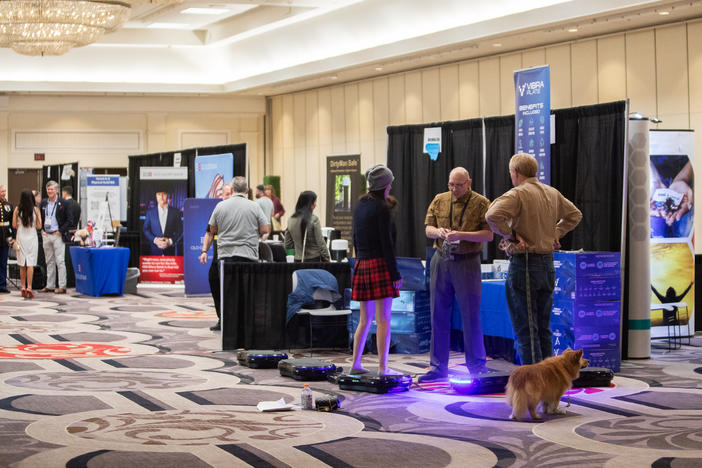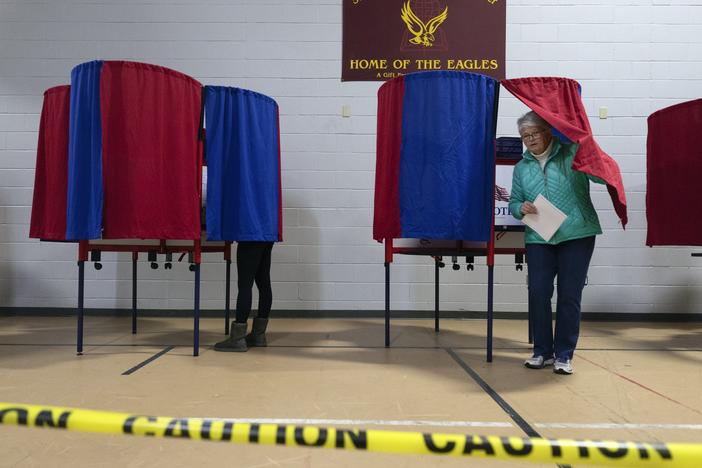Section Branding
Header Content
Telecoms delay 5G launch near airports, but some airlines are canceling flights
Primary Content
The FAA says 5G service could interfere with critical navigation systems on some aircraft and will restrict flights into some airports, which could lead to widespread delays and cancellations.
Transcript
MARY LOUISE KELLY, HOST:
Verizon and AT&T have once again agreed to delay turning on 5G towers near certain airports. Airlines say the signals could interfere with critical navigation equipment on some aircraft and would have a catastrophic impact on their industry. But the wireless providers will roll out 5G service elsewhere after midnight tonight. NPR's transportation correspondent David Schaper is here. Hey there.
DAVID SCHAPER, BYLINE: Hey, Mary Louise.
KELLY: So I got to say I've been looking forward to 5G service - better quality streaming, speed up my phone. What, from an aviation perspective, is exactly the problem with it?
SCHAPER: Well, in order to get that amazing step-up in mobile phone service, the telecom companies needed more bandwidth. And they purchased a big chunk of it in the C band. And the problem is where the C band spectrum is located. It's right next to the frequencies used by radio altimeters on airplanes and helicopters. Those are a navigational tool that tells pilots exactly how far above the land or terrain below them they are. It's a critical piece of safety equipment used by pilots when landing and flying in bad weather, when visibility is poor. And the concern here is that the 5G transmissions from cell phone towers will interfere with some of the older radio altimeters on some planes. And that's led the FAA to raise some red flags over safety.
KELLY: OK, so they've raised red flags. Can the FAA do more than that? I mean, they can't just ban 5G.
SCHAPER: Well, no, they can't. And the FAA oversees aviation safety. It's the FCC that governs the airwaves. The FCC agreed to auction off this section of spectrum to AT&T and Verizon for close to $80 billion back in 2020. And the FCC says its engineers believes 5G can safely coexist next to the aviation frequency without causing any problems. But the FAA just isn't so sure. And with the launch of 5G service looming, the FAA did the only thing that it could do, which is restrict flying of certain aircraft that might have this radio interference problem at certain airports, especially in bad weather.
So both the passenger and cargo airlines said, hey; that would force us to cancel or divert or delay potentially hundreds of flights a day, affecting tens of thousands of passengers. The airlines' CEOs warned that the nation's commerce might grind to a halt as a result.
KELLY: Well, it sounds like Verizon and AT&T are listening. They have agreed to adjust their plans to address some of these concerns. What's going to happen?
SCHAPER: Well, they're still going to roll out 5G as planned almost everywhere, as you said at the top. And while they insist their 5G signals will not interfere with the aircraft radio altimeters, that there is enough distance between the two bands of spectrum, they say they have voluntarily agreed to not turn on certain 5G towers around certain airports and runways or, in the case of Verizon, limit our 5G network around airports. They want to limit the possibility of interference. It's just not clear yet how many towers and which airports will be totally affected. This is the third time these companies have done this - delayed 5G rollout. But I did speak with former FAA administrator Michael Huerta about what's next.
MICHAEL HUERTA: What really needs to happen is a very detailed tech analysis, airport by airport and aircraft type by aircraft type, to determine how real this interference potential actually is.
SCHAPER: And that's work that these telecommunications companies say should have already been done by now. And they insist, again, that this will be safe. They blame the airlines and the FAA for not addressing these issues sooner.
KELLY: NPR's David Schaper. Thanks, David.
SCHAPER: Thanks so much, Mary Louise. Transcript provided by NPR, Copyright NPR.
Bottom Content



